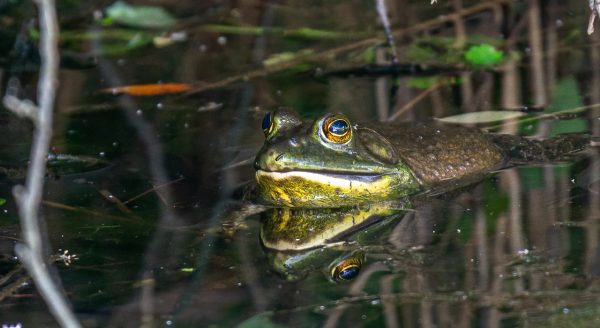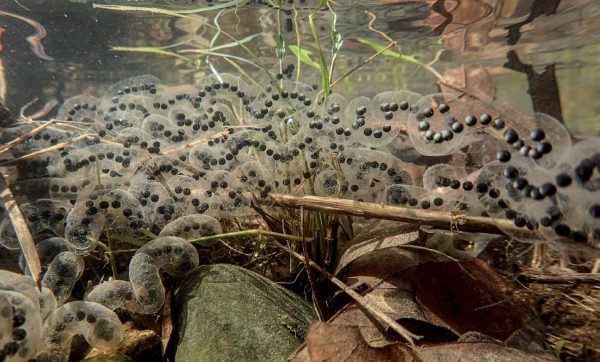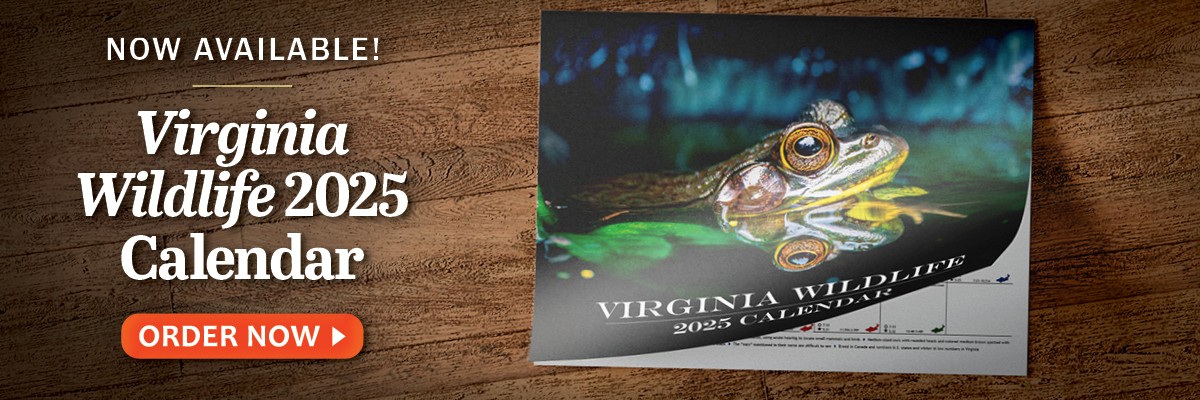
American bullfrog Photo by Carol Annis
For many of us, the arrival of summer brings with it the start of lawn and garden maintenance. How you care for your lawn and garden can impact your local frogs. Frogs and other amphibians are highly vulnerable to contaminants, including the pesticides and fertilizers used as part of home lawn and garden care. Since amphibians have permeable skin allowing them to breath through (at least partially) and absorb water into their bodies, contaminants can easily enter into their system. Their eggs and larvae/ tadpoles are particularly vulnerable to these toxins. The jelly-like eggs of amphibians, lack an outer protective shell and since they absorb moisture from the water during development, they can also readily absorb any toxic substances that may be in the water. Remember, even if frogs or other amphibians are not living directly on your property, any pesticides or fertilizers used in your yard can travel by runoff when it rains and end up contaminating frog habitat in a stream or wetland miles away. By making some of the simple changes to your lawn and garden care listed below, you can begin making a difference for your local frogs and other amphibians.
How to Reduce Your Pesticide Use
- Move wood piles away from your house and pick up litter and garbage to minimize the attraction of pests to your home.
- Provide good drainage on your property to make it less attractive to mosquitoes; they breed in standing water.
- Plant a variety of native plants. Natives are often hardier than non-natives and are less vulnerable to pests and diseases. A variety of native plants will create bio-diversity on your property, which will attract a variety of beneficial wildlife, including frogs, that provide natural pest control.
- Rotate the plants in your annual garden. Switching the plants in your annual garden year-to-year makes it difficult for pests dependent on certain plants to become established.
- Avoid using insect repellents that contain DEET; it’s harmful to frogs and other amphibians.
How to Reduce Your Fertilizer Use
- Leave the grass clippings from your mowing to decompose on your lawn. These decomposed grass clippings are a natural way to feed your lawn.
- Start composting. Placing compost in your garden will provide it with nutrient rich soil, reducing the need for a chemical fertilizer.
- Make the switch to natural, organic fertilizers rather than using synthetic, chemical fertilizers. Nutrients in organic fertilizers are released more slowly over time, requiring fewer applications than chemical fertilizers.
- Apply fertilizer when the soil is moist and lightly water. The moisture will help the fertilizer move into the root zone instead of blowing or washing away.
- Avoid fertilizer application prior to a heavy rain, which could wash the fertilizers into nearby streams and wetlands. Check the forecast before applying.
Additional Tips
- Avoid dumping household chemicals down the drain of your sink, into your toilet, or into storm drains or sewers. Check with your local waste management office to find out how to properly dispose of these substances.
- Pick up your pet’s waste. Just as pesticides and fertilizers can wash away into streams and wetlands, so too can the bacteria and viruses found in pet waste.

Eastern American toad eggs © Steven Johnson


